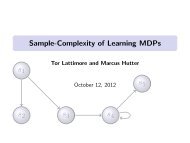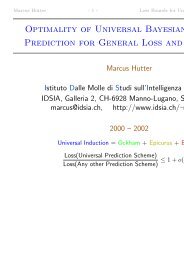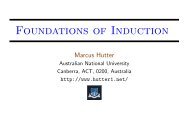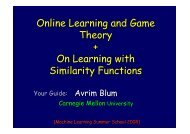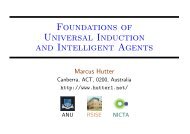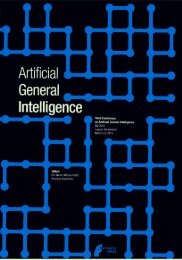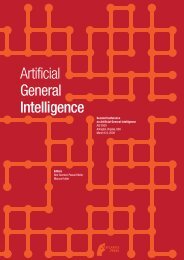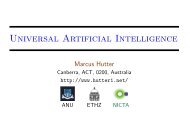Algorithmic Learning Theory - of Marcus Hutter
Algorithmic Learning Theory - of Marcus Hutter
Algorithmic Learning Theory - of Marcus Hutter
You also want an ePaper? Increase the reach of your titles
YUMPU automatically turns print PDFs into web optimized ePapers that Google loves.
Editors’ Introduction<br />
<strong>Marcus</strong> <strong>Hutter</strong>, Rocco A. Servedio, and Eiji Takimoto<br />
Philosophers have pondered the phenomenon <strong>of</strong> learning for millennia; scientists<br />
and psychologists have studied learning for more than a century. But the analysis<br />
<strong>of</strong> learning as a computational and algorithmic phenomenon is much more<br />
recent, going back only a few decades. <strong>Learning</strong> theory is now an active research<br />
area that incorporates ideas, problems, and techniques from a wide range <strong>of</strong><br />
disciplines including statistics, artificial intelligence, information theory, pattern<br />
recognition, and theoretical computer science. <strong>Learning</strong> theory has many robust<br />
connections with more applied research in machine learning and has made significant<br />
contributions to the development <strong>of</strong> applied systems and to fields such<br />
as electronic commerce and computational biology.<br />
Since learning is a complex and multi-faceted phenomenon, it should come<br />
as no surprise that a wide range <strong>of</strong> different theoretical models <strong>of</strong> learning have<br />
been developed and analyzed. This diversity in the field is well reflected in the<br />
topics addressed by the invited speakers to ALT 2007 and DS 2007, and by the<br />
range <strong>of</strong> different research topics that have been covered by the contributors to<br />
this volume in their papers. The research reported here ranges over areas such<br />
as unsupervised learning, inductive inference, complexity and learning, boosting<br />
and reinforcement learning, query learning models, grammatical inference, online<br />
learning and defensive forecasting, and kernel methods. In this introduction we<br />
give an overview first <strong>of</strong> the five invited talks <strong>of</strong> ALT 2007 and DS 2007 and then<br />
<strong>of</strong> the regular contributions in this volume. We have grouped the papers under<br />
different headings to highlight certain similarities in subject matter or approach,<br />
but many papers span more than one area and other alternative groupings are<br />
certainly possible; the taxonomy we <strong>of</strong>fer is by no means absolute.<br />
Avrim Blum works on learning theory, online algorithms, approximation algorithms,<br />
and algorithmic game theory. His interests within learning theory include<br />
similarity functions and clustering, semi-supervised learning and co-training,<br />
online learning algorithms, kernels, preference elicitation and query learning,<br />
noise-tolerant learning, and attribute-efficient learning. In his invited talk for<br />
ALT 2007, Avrim spoke about developing a theory <strong>of</strong> similarity functions for<br />
learning and clustering problems. Some <strong>of</strong> the aims <strong>of</strong> this work are to provide<br />
new insights into what makes kernel functions useful for learning, and to understand<br />
what are the minimal conditions on a similarity function that allow it to<br />
be useful for clustering.<br />
Alexander Smola works on nonparametric methods for estimation, in particular<br />
kernel methods and exponential families. He studies estimation techniques<br />
including Support Vector Machines, Gaussian Processes and Conditional Random<br />
Fields, and uses these techniques on problems in bioinformatics, pattern<br />
recognition, text analysis, computer vision, network security, and optimization<br />
for parallel processing. In his invited lecture for ALT 2007, co-authored with<br />
Arthur Gretton, Le Song, and Bernhard Schölkopf, Alexander spoke about a




